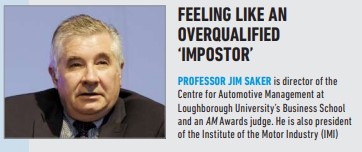For several years, I have been fascinated by the topic of the imposter syndrome. The concept was originally put forward in the late 1970’s in relation to studies of brilliant women who had achieved recognition but felt that they weren’t as bright or as able as their position suggested.
Successful women such as Sheryl Sandberg and Michelle Obama have confessed to experiencing the syndrome. If you add the issues of race and class into the intersectional mix you realise that the concept inevitably impacts a wide range of people.
The syndrome can be found in men as well as women.
I am reminded of a conversation that I had with a Professor at All Souls, Oxford who despite being a leading authority on his subject and having been in post for 12 years simply said that ‘you never get over the feeling that you are an imposter in this type of institution.’
People can easily feel a fraud or perceive themselves to be outside the frame of reference of a particular social group. As has been discussed in previous articles within AM our industry has historically not been particularly attractive to women employees and to workers from a number of ethnic backgrounds and this has led to them to being significantly underrepresented in the workforce.
People want to feel ‘at home’ in their work environment with a sense that they belong and are not an imposter who happens by some stroke of luck to have a desk there.
From a personal perspective I was the first person in my family, Church, youth club or group of friends to go to university. I felt odd and quite estranged from my background having been brought up ‘down the Old Kent Road.’
To compound it my parents couldn’t afford the fare/petrol to drop me off on my first day. Now this is not meant to be a confessional or a ‘pity party’ on my behalf but simply to put forward that I had the perception that I had no immediate role models with whom I could identify and learn from in the University setting.
The challenge for many when looking at the motor industry is that they don’t see themselves reflected in the people already employed and as a result would not feel at home.
When I joined the motor industry, I again was made to feel like an overqualified imposter and was simply known as ‘three degrees.’
One thing that the motor industry has for an imposter is that for most of the time the sector behaves like a meritocracy. If you deliver you succeed.
Of course, there are issues of the glass ceiling for women and prejudice over race and disability for others.
The reassuring thing is that when you do succeed, the success is usually rewarded and psychologically you begin to feel that you belong.
With more diverse role models we could encourage more people to have the confidence to join the industry and in so doing help to address the current staff shortages.



















Login to comment
Comments
No comments have been made yet.